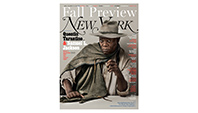 |
1. In the last issue, Lane Brown interviewed the director Quentin Tarantino (“In Conversation: Quentin Tarantino,” August 24–September 6). The story gave readers plenty to pick apart. “It’s awesome that someone like Tarantino — who you’d assume would only like old niche films and bizarre B-level Tokyo movies (he does like them) — thinks movies like The Fighter and American Hustle are great and watches a show like How I Met Your Mother,” wrote commenter Hendo1sm. “It’s a good reminder for people on their cultural high horses to be open to everything.” Salon’s Anna Silman homed in on Tarantino’s television habits as well. “We hope those rumors about Tarantino doing a TV show are true,” she wrote. “Because we would love to see how this combo of influences plays out in his hands. A blood-splattered multi-cam rom-com about a group of six renegade U.S. marshals (who are also BFFs!) starring Walton Goggins and full of frenetic Sorkinesque walk-and-talks?” The Mic’s Kevin O’Keeffe thought the interview enhanced the director’s reputation of being unpredictable. “His quotes range from the incredibly progressive — a fervent defense of President Barack Obama, gleefully decrying the end of ‘white supremacy’ — to the strangely out-of-touch — does he really think The Newsroom was a great HBO series?” Many just enjoyed hearing Tarantino sound off on so many subjects. “Tarantino is a great interview subject in general because he’s so goddamned enthusiastic and loquacious,” said Devin Faraci on the website BirthMoviesDeath. “This interview with Quentin Tarantino knows no bounds,” tweeted NPR’s Bill Chappell. “And that’s a good thing.”
 |
2. “If 12-year-olds Anissa Weier and Morgan Geyser knew that the internet character they worshipped was a fantasy, why did they want to kill their friend for him?” asked Lisa Miller in her story on what’s become known as the Slender Man stabbing (“Slender Man Is Watching,” August 24–September 6). The Hairpin’s Alexandra Molotkow thought the piece spoke to how strange it is to be 12. “Twelve is right in the twilight zone between play and real life. You don’t know your own mind at that age, and your identity is not what it was last month. You understand that your actions have consequences, but you don’t have a fully formed concept of the future; how could you?” she wrote. Many were simply stunned by the details of the case. “My blood is curdling reading this,” tweeted Megan Hess. And many more found the story difficult to read before bedtime. “Insane article I recommend reading — but not in bed, right before you go to sleep. Like I did,” tweeted Beth Mechum. This is “essential true-crime reading,” wrote True Crime’s Cheryl Eddy. “Though their victim survived, the case evokes the fantasy-driven killing that inspired Heavenly Creatures, but with a distressingly modern twist.”
3. “In his self-appointment as America’s moralist, Franzen has suffered from the lack of a worthy female foil,” wrote Christian Lorentzen in his essay on Jonathan Franzen’s new book, Purity (“Jonathan Franzen’s Great Expectations,” August 24–September 6). Lorentzen went on: “Perhaps because he’s lonely at the top, Franzen elevated Jennifer Weiner — the best-selling but subliterary novelist who’s led the #Franzenfreude charge, claiming that he’s sucked up the oxygen of review attention in a sexist literary culture — by accusing her of ‘freeloading’ on a good cause with the aim of self-promotion.” “This section … makes me want to set something on fire,” tweeted The Guardian’s Jessica Valenti. “ ‘Bestselling but subliterary’ is the oldest weapon against successful female authors,” added Aisha Muharrar. “See Austen, Jane.” Jennifer Weiner herself stepped in: “By dismissing my work as ‘subliterary,’ suggesting I’m unworthy to kiss the hem of Jonathan Franzen’s garment and implying that a writer — or maybe just a woman — must meet his personal standards before she’s permitted to discuss gender balance in the literary world, Christian Lorentzen illustrated the sexism and elitism women writers continue to face more vividly than any essay, review, or report ever could.” Lorentzen’s essay also poked holes in Franzen’s reputation as a literary heavyweight, a downgrading that many commenters were pleased to see. “For the life of me, I can’t understand Franzen’s reputation. Is it merely because the United States needs a male novelist of stature?” wrote commenter TerenceCanada. “Yes, we need novels about the everyday, but Franzen’s books are too banal to deserve the attention they get.”
4. Gabriel Sherman’s story on the three-way (mostly civilized) contest to become the next publisher of the New York Times led some readers to bristle at the casually discussed nepotism (“The Heirs,” August 24–September 6). “The best way to land a top newspaper job is to have a great great grandfather who was rich,” tweeted Mother Jones’s Patrick Caldwell. Fortune’s Mathew Ingram thought the piece was “a great look at the closest thing that the media world has to a royal family,” but he argued with Sherman’s assertion that “the selection of the next publisher is perhaps the most critical challenge facing the Times.” “Choosing a publisher may be the most critical challenge facing the various branches of the Sulzberger family,” wrote Ingram. “The challenge facing the New York Times is the same one that virtually every traditional media entity is facing, whether it’s the Washington Post, or Time Inc. (which owns Fortune), or even TV giants like CBS. The time when a handful of news outlets controlled the only platforms for distribution — and hence, the advertising revenue attached to those platforms — is gone. And it’s not clear what the NYT’s role is going to be in the new world.” And, he wondered: “Is this really the moment when the fifth generation of a founding family should be holding the reins?”